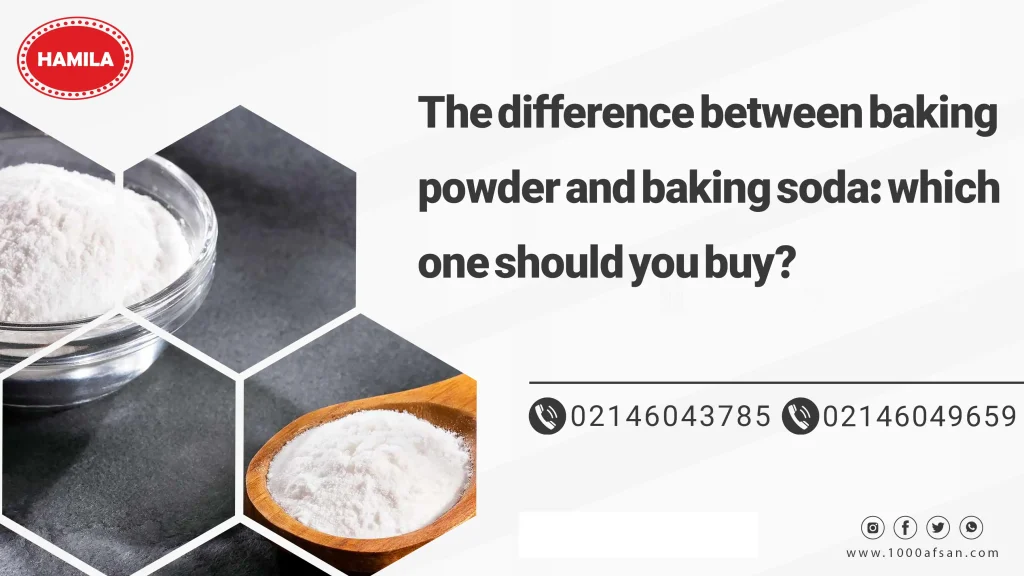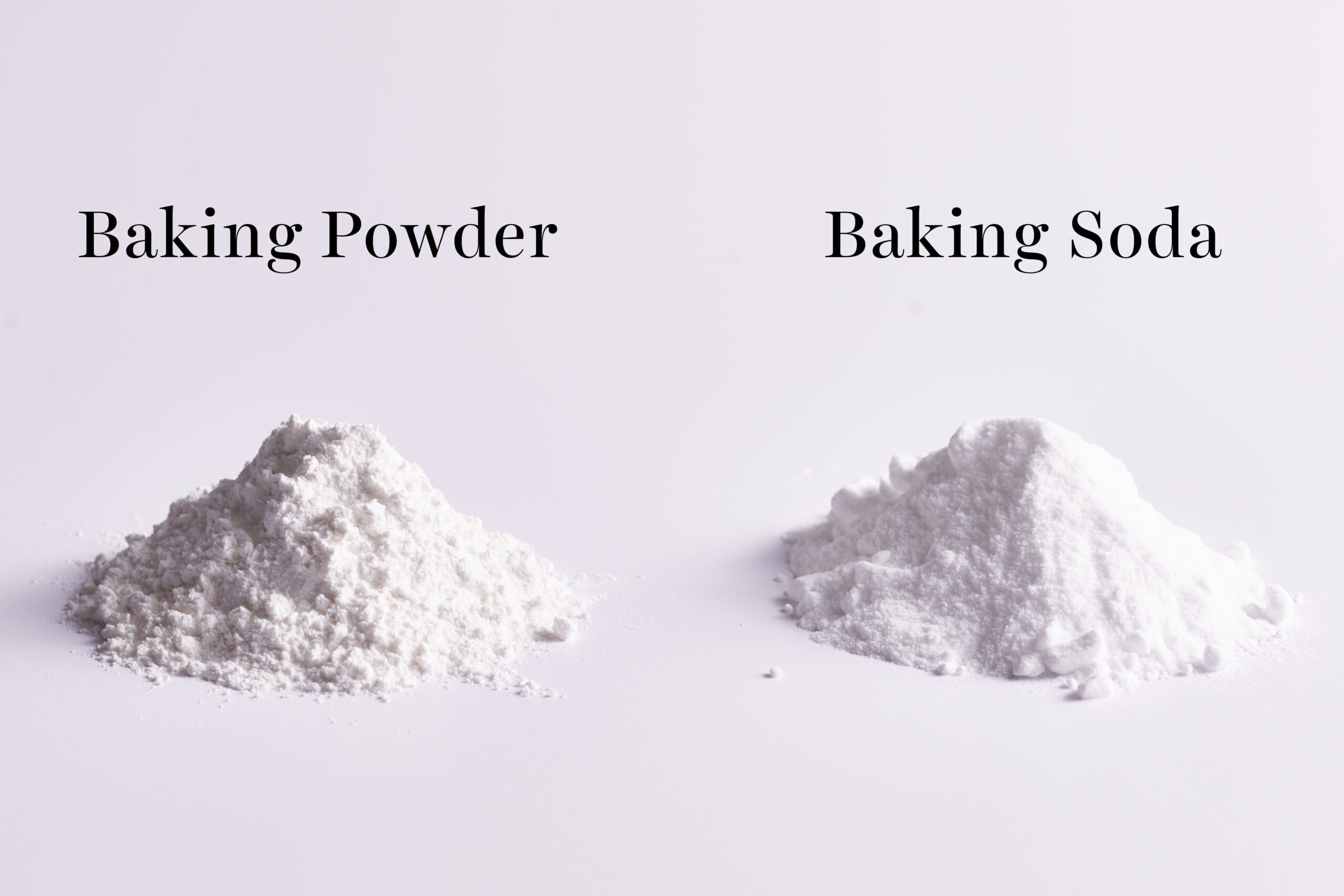The difference between baking powder and baking soda: which one should you buy?

The difference between baking powder and baking soda: which one should you buy?
In the world of cooking and baking, the correct selection of raw materials plays a very important role in the final quality of the food. One of the things that can be confusing for many cooks and pastry chefs is the difference between baking powder and baking soda. These two chemicals are commonly used as leavening agents, but there are many differences between them that can greatly affect the final result of cooking. In this article, we will take a deep look at the difference between baking powder and baking soda and provide important tips for buying and using these two substances correctly.

The difference between baking powder and baking soda: baking powder
Baking powder is a chemical compound that is used to help bulk the dough and bake bread and cakes. Baking powder usually contains three main ingredients: baking soda, one or more acids (such as cream of tartar), and a filler such as cornstarch. This compound works independently and does not need an external acidic substance to produce carbon dioxide gas.
The difference between baking powder and baking soda is that baking powder automatically reacts with water and heat and produces carbon dioxide gas. This feature makes baking powder suitable for recipes that do not contain acidic ingredients. In fact, baking powder does not need to add a separate acid source because of the acids in its composition.
The difference between baking powder and baking soda: baking soda
Baking soda, scientifically known as sodium bicarbonate, is a strong, white chemical commonly used as a leavening agent in cooking. Baking soda alone cannot act as an effective leavening agent unless it is combined with an acidic substance. The reaction between baking soda and an acidic substance (such as lemon, vinegar or yogurt) produces carbon dioxide gas, which increases the volume of the dough and creates a light and fluffy texture in baked products.
The difference between baking powder and baking soda: baking soda
The difference between baking powder and baking soda is that baking soda reacts immediately after combining with an acidic substance and does not require heat. This property makes baking soda a good choice for recipes that require immediate action.

Compounds and reactions:
Baking powder: contains baking soda and acidic substances that automatically react in contact with liquids and heat. This property makes baking powder suitable for recipes that require a uniform leavening agent. In other words, baking powder can work without the need for a separate acid source.
Baking soda: It needs an acidic substance to produce carbon dioxide gas. Without this acidic substance, baking soda cannot function properly. For this reason, baking soda is usually used in recipes that contain acidic ingredients.
How to use:
Baking powder: It is usually used in recipes that need to bulk up the dough during cooking, such as cakes and cookies. This feature makes baking powder a good choice for recipes that require more preparation time.
Baking soda works well in recipes that contain acidic ingredients, such as yogurt, vinegar, or lemon juice. This feature shows the difference between baking powder and baking soda in their specific applications.
Reaction time:
Baking powder: usually reacts in two steps – one in contact with liquids and the other in heat. This feature means that baking powder is more suitable for recipes that require more preparation time. This two-step reaction time is one of the important differences between baking powder and baking soda.
Baking Soda: Reacts immediately after adding to acidic substances and in contact with heat. Therefore, baking soda is a better choice for recipes that require immediate action, such as quick biscuits and cookies.
Effect on taste:
Baking powder: usually does not affect the final taste, because the acid and alkali present in it work in balance. This feature makes baking powder a good choice for recipes that require a neutral taste.
Baking Soda: Can alter the taste of the finished product, especially if used in large amounts or not properly mixed with acidic ingredients. For this reason, you should make sure that baking soda is used in the right amount and in combination with acidic substances.
Considering the difference between baking powder and baking soda, which one should you buy?
Choosing between baking powder and baking soda depends on the type of recipe and your specific needs:
- If your recipe includes acidic ingredients: baking soda is a good option and works well. In this case, baking soda can help create a light and fluffy texture in the dough.
- If your recipe does not contain acidic ingredients or you need a uniform leavening agent: baking powder will be the best choice. Due to its special characteristics and the ability to act without the need for an acid source, this material is a suitable option for recipes that require puffing the dough.
Final tips for using and the difference between baking powder and baking soda:
- Keeping the right amount: Using large amounts of baking powder or baking soda can change the taste and texture of the final product. Always follow the instructions and use the exact amount to avoid unwanted changes.
- Storage: Both materials should be stored in a dry and cool place. Also, check their expiration date before use has not passed To maintain optimal performance, it is best to store both ingredients in tightly closed containers.
- Quality test: Before using baking powder or baking soda, you can check their quality with a simple test. For example, for baking powder, you can mix a little bit of it with water and see if gas bubbles are produced. For baking soda, you can mix it with a little vinegar and see if a carbon dioxide gas reaction occurs.
By carefully understanding the difference between baking powder and baking soda and choosing the right one for your recipes, you can achieve better results in the kitchen and have a pleasant cooking experience. By following these tips, you can easily decide which ingredient is best for each specific recipe and ensure the final quality of your baked product.



